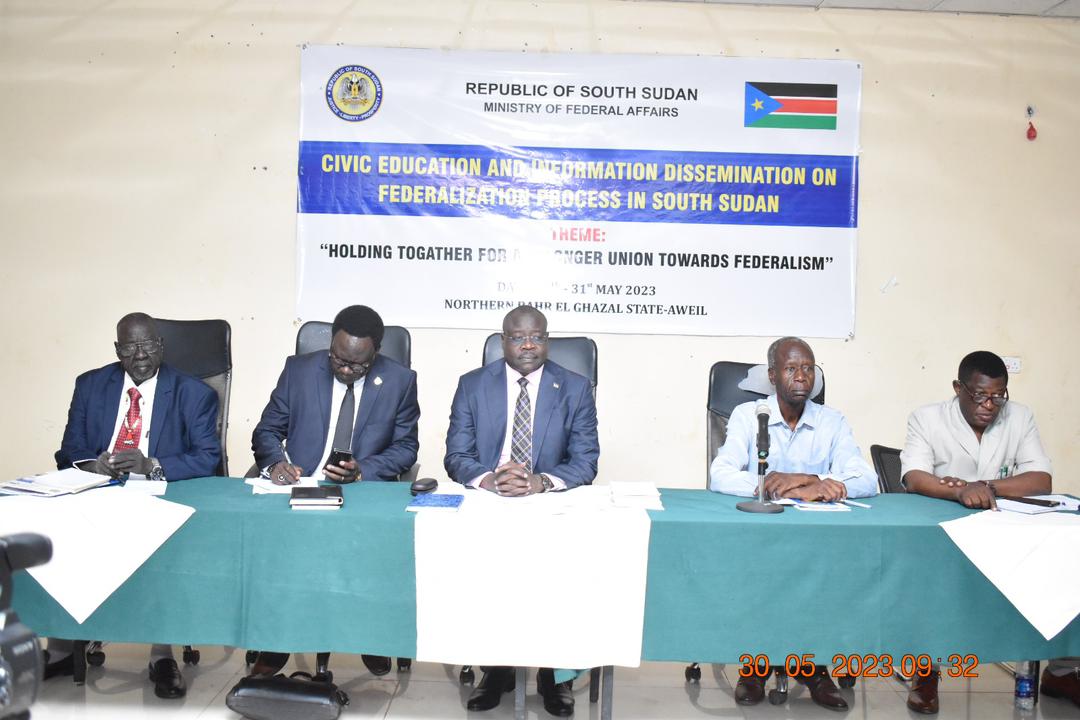A three-day consultative workshop on federalism has kicked-off in Aweil Town of Northern Bahr el Ghazl State.
The workshop organized by the Ministry of Federal Affairs with support from the national government brought about 150 delegates including national and state government officials, local chiefs, civil society, faith-based groups, and persons with disabilities, women as well as youth.
The workshop which officially begun on Monday morning is aimed at carrying out a nationwide information dissemination and civic education is expected to end on Thursday.
Experts and government officials will conduct presentations on strategic plan of the Ministry of Federal Affairs, rational and potential benefits on global conceptual analysis on federalism, political, administrative and fiscal power sharing in a federal system of government.
Participants will also listen to presentations on tax collection, revenue and resource allocation in a federal state, comparative federal system in Africa and judiciary system with case study on Nigeria and South Africa and Canada.
This is a second time the Ministry of Federal Affairs is conducting a people-centered consultative workshop on federalism.
Speaking during the opening session on Monday, the Minister of Federal Affairs, Losuba Ludoru Wongo said federal system of government will help in shaping the society and address prevailing problems within communities in South Sudan.
“South Sudanese are one people and we do not distinguish where you come from and where you want to go. What is important is that there is respect to rule law, there is respect to fundamental human right and there is respect to ensure that there is good level of public finance management in the public offices. These are aspects which are critical to the governance challenges that we have been facing and then we want to rectify, so we want a good governance that promotes peace and stability and this is why we are here”
Losuba stated that federalism would help simplify devolution of powers which will enhance accountability in all sectors of governance.
“With federal system we want to see how we devolve these powers from the central level which is the federal level to the local government level it’s not only devolving powers but we also devolve resources. The element of accountability becomes very critical in federalism because when we devolve powers and resources we want to ensure that you use these resources to meet the needs of the beneficiary who are our people in the grassroots level
For his part, the Deputy Governor Tong Lual Ayat and Acting Governor of Northern Bahr el Ghazal State explained that introduction of a federal system will ease the load and political powers congested at the seat of the national government in Juba.
He said the system will also allow South Sudanese citizens to be in charge of their resources and know how they are spent.
“When you have a federal system of government employment will not be much concentrated in Juba but will be in the states because powers and resources will be devolved in the local levels. The national government will be small in size maybe 15 or 16 ministers”
Some of the participants who shared their expectations applauded the government for carrying out a grassroots consultation process to seek the voices of the local people on the system of government for South Sudan.
David Lual a representative of the faith-based group and pastor in the Baptist Church in Aweil Town said the consultative session will offer them an opportunity to evaluate if federalism is the suitable system to govern their country.
“The government does not usually honor or listen to the people but with this system and the fact that the government came to consult with the people is a good step. If the federal system is for the good we will accept it, if it’s bad we will also have our say”
Last month the ministry held similar workshop in Yambio Town of Western Equatoria State.











